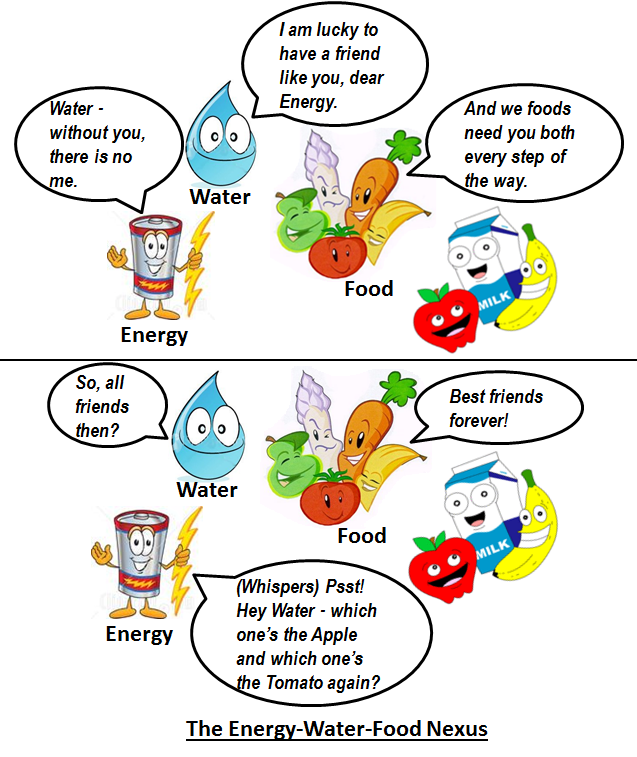As far as technical reports go, the Soggy Lettuce Report (2004) is as delightful a name as any. According to the report: “More money is wasted on food each year [in the United Kingdom] than any other category of goods and services – a whopping ₤424 per person.” But money isn’t the only loss – gone with the wasted soggy lettuce are its embodied energy and water.
The Nexus: Energy, water and food are inextricably intertwined. In a recent forum, Machell et al. discuss the interdependencies between the three (also called the Energy-Food-Water Nexus). “Food production consumes both water and energy in order to grow, harvest, clean and prepare food.” (Machell et al.) Water and energy are interdependent too. Water is indispensable for every phase of energy production. Steam generation for electricity, extraction of fossil fuels, and cultivation of biofuel crops – all of these depend on water. On the other hand, it takes energy to treat and distribute water for human use.
So, letting food go to waste means we are also wasting water. Leaving a faucet running unnecessarily wastes not only water, but also the energy it took to extract, treat and send the water to that faucet. By leaving the lights on or letting an idling car needlessly guzzle fuel (petrol, diesel, and yes, even electricity), we are wasting energy that could have been used to clean water or grow food.
Policy implications: It is important that we develop future policies using the nexus perspective. “…[C]auses that might upset the nexus balance are increasingly requiring global solutions and there is a great need for joined-up activities between stakeholders to mitigate future resource conflicts.” (Machell et al.)
A deeper understanding of this nexus balance will help us change our perceptions and consumption patterns. That soggy lettuce that we throw away has far-reaching environmental implications as well as opportunities for energy recovery [1,2,3]. International trade [4], climate and water policies [5], renewable energy [6,7], and wastewater treatment [8] have interlinked environmental and social impacts [9] that can be identified only through comprehensive nexus analysis. As mentioned in the article, “The complex relationships in the water energy food nexus, require informed production and consumption decisions for the near future that can mitigate negative impacts on risk, security, and the environment.”
The Wire had it right: The interdependencies between energy, water and food cannot be compartmentalized and studied in isolation. Detective Lester Freamon said it best: “All the pieces matter.”
Find out how by reading the full article for free*:
The water energy food nexus – challenges and emerging solutions
Environ. Sci.: Water Res. Technol., 2015, 1, 15-16
DOI: 10.1039/C4EW90001D
—————-
About the webwriter
Paramjeet Pati is a PhD Candidate at the Virginia Tech Center for Sustainable Nanotechnology (@VTSuN).
You can find more articles by him in the VTSuN blog, where he writes using the name coffeemug.
—————-
*Access is free through a registered RSC account.










